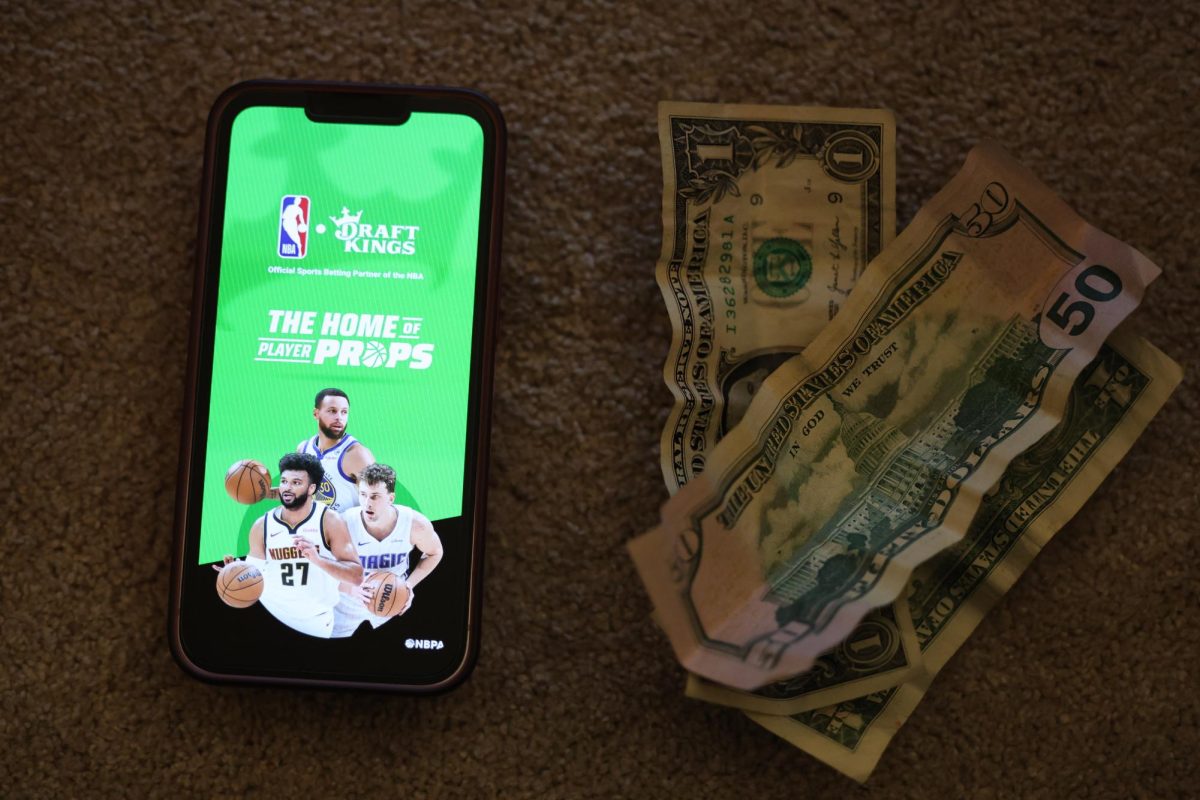In one of my classes last semester, I sat in front of a large group of guys. As far as I know, they did not know each other prior, but when there was time, I could always hear them bonding behind me over the parlays (parlays are made when multiple bets are combined into a single wager to maximize a possible payout) they lost the night before and the ones they were planning to place that night.
I can’t lie and say I wouldn’t listen in, finding myself judging or choosing my own picks and understanding how money was being lost. But more importantly, it became glaringly apparent that sports betting was a popular pastime of those around me — which couldn’t really be shocking. Turn on the broadcast of any sporting event and you will see the DraftKings or Fanduel advertisements on the sides of courts, fields and even the microphones of announcers. But what never completely registered was just how much these apps and ads rely on and cater to college-aged sports fans.
“All you need is a feeling and a phone,” said the Hard Rock Bet commercial narrator after showing Post Malone winning big. “Every Hail Mary pass is one tap away from you doing your victory dance,” said Jamie Foxx for seemingly his 100th BetMGM Sportsbook ad. While advertising gambling used to be unheard-of for sports broadcasts (mainly when the act itself disappeared under the table in between Congress passing and striking down the Professional and Amateur Sports Protection Act in 1992 and 2018), it has become a part of sports, specifically the NFL, NBA and MLB. There is now almost no separation between watching sports and betting on them.
What is making this new wave of sports betting so destructive (Americans have spent more than $450 billion on bets since 2018, according to Legal Sports Report) is not only the number of ads we see for it but the nature of each one. Gambling, something that can become a pernicious rabbit hole, has recently been displayed as something different — a newly unserious, simple activity. You don’t have to go to a betting room or “know everything about every sport” (or so says BetMGM); you can be like Kevin Hart and LeBron James, lounging on the couch in their DraftKings commercial, simultaneously acquiring money with their active online bets. Winnings — and their apparent attainability — have become so accessible, being only one download or “tap” away. For college students, this is likely the only attitude they’ve grown to know towards sports betting.
According to a 2023 study by the NCAA, 67% of 18 to 22-year-olds on college campuses have participated in sports betting. 63% remember seeing betting ads (which is more than the general population), and 58% of those claim they are more likely to bet after seeing them. Additionally, the University of Maryland School of Medicine described college-aged sports betting as the “perfect storm” due to things such as their vast exposure to legal and glorified gambling, the likelihood of their access to money and the range of at-risk behaviors associated with their age. As sports gambling sees its rise around the country, the betting apps are continually cashing it in on the underdeveloped minds of whom gambling is presented as an easygoing habit.
I decided to ask a few students living in my residence hall about their betting habits. After a Super Bowl watch party was hosted in our communal lounge, I became aware of the number of avid sports fans around and wondered how many of them partake in gambling. While most did not bet on the Super Bowl, many did admit to previous sports betting, and of those, almost everyone stated they had lost money doing it. “Oh, yeah,” one responded when asked whether they had lost money before, another adding, “Not on the Super Bowl, but overall, I’m probably down.” Of those who did not personally bet, each said they knew many who did, one stating, “Oh, yes — every single guy,” when asked. In addition, each individual claimed that they had noticed the increase in the number of ads and agreed that gambling was a growing problem. “They’ve always got the number to call if you have [a gambling] addiction,” one stated, “but no one [who has one] really knows they do.” Of those I asked, none seemed to bet fairly consistently but either had participated in sports gambling, knew many who did or described a combination of the two.
Gambling and its consequences have always been an issue. It’s not as if sports gambling and its addictions were invented in 2018, but the accessibility to it pretty much was. We are experiencing how betting is changing sports and how people perceive them in real-time, but what remains unknown are its glamorization’s long-term effects on the youngest generation exposed to it. I mean, imagine if, in a cigarette commercial, Post Malone was there to greet you and said, “It’s only a single ride to your nearest convenience store away… Go take the load off with a pack of Camels,” or if at the end of an alcohol ad, Jamie Foxx was like, “What’s the harm in one more? The pack has six Coronas for a reason.” It just wouldn’t happen. Instead, in our current reality, sports gambling is advertised in shiny, bright lights as if any form of crippling addiction is far beyond it. Betting here and there doesn’t exactly have to be avoided. One just can’t be naive enough to forget that every time they bet for the Kansas City Chiefs’ or New York Knicks’ or Los Angeles Dodgers’ downfall, the app they’re using is betting on their own.





































































































































































































John • Feb 21, 2025 at 5:40 pm
The long term effect of sports gambling is still to be determined. It has become so easy to place the bets that it is likely that large debts are going to be incurred by many young people. The “house” rarely loses in gambling.
It might be good to keep in mind that the huge, grand casinos that we see all around the country are not built because the house loses.
And NIL is a similar disaster waiting to happen.